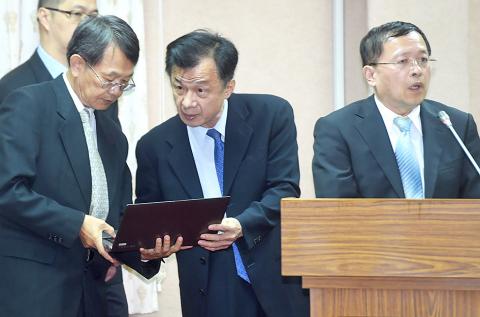A joint crime-fighting agreement between Taiwan and China has not been used to its full potential since the Democratic Progressive Party took power in May, Minister of Justice Chiu Tai-san (邱太三) said yesterday.
Answering questions from lawmakers at a meeting of the Judiciary and Organic Laws and Statutes Committee, Chiu said that although investigations, information-sharing and regular paperwork processing have carried on as usual, there has been a lack of administrative personnel exchanges between the two sides, with neither party participating in visits — as stipulated by the agreement — since President Tsai Ing-wen (蔡英文) took office in May.
The Cross-Strait Joint Crime-Fighting and Judicial Mutual Assistance Agreement (海峽兩岸共同打擊犯罪及司法互助協議), signed in April 2009 under the previous Chinese Nationalist Party (KMT) administration, is aimed at bolstering cross-strait crime-fighting efforts.

Photo: Chien Jung-fong, Taipei Times
Deputy Minister of Justice Chen Ming-tang (陳明堂) said that a workshop for cross-strait law enforcement officers that was to have taken place in June and July has been postponed indefinitely.
The delay has “something to do with” the condition of cross-strait relations, Chen said, adding that administrative contact between the two sides via telephone and fax remains normal.
Taiwan and China have jointly cracked 185 criminal cases and arrested 8,829 people since May 20, the ministry said.
However, KMT Legislator Jason Hsu (許毓仁) said that only nine of 198 Taiwanese telecommuncations fraud suspects deported to China from other countries have been allowed visits from family members.
Hsu asked whether the joint crime-fighting program was still viable and whether negotiations with China are still possible.
Chiu said that the program’s success depends on bilateral commitment and the nation remains in talks with China via telephone, although there have been no public meetings.
The nine suspects were allowed family visits because of the government’s efforts, Mainland Affairs Council (MAC) Deputy Minister Chang Tien-chin (張天欽) said, adding that visiting a suspect before a verdict is reached is prohibited in China.
The council would still negotiate with Beijing to protect the suspects’ rights, Chang said.
Democratic Progressive Party Legislator Chang Hung-lu (張宏陸) said that while former president Ma Ying-jeou’s (馬英九) administration recognized the so-called “1992 consensus,” Taiwanese suspects in a case in Kenya were still deported to China in April, adding that the problem is not about recognition of the “1992 consensus.”
Chang Tien-chin said that the cross-strait hotline is not working.
The “1992 consensus,” a term former Mainland Affairs Council chairman Su Chi (蘇起) admitted to making up in 2000, refers to a tacit understanding between the KMT and the Chinese government that both sides of the Taiwan Strait acknowledge there is “one China,” with each side having its own interpretation of what “China” means.

Nipah virus infection is to be officially listed as a category 5 notifiable infectious disease in Taiwan in March, while clinical treatment guidelines are being formulated, the Centers for Disease Control (CDC) said yesterday. With Nipah infections being reported in other countries and considering its relatively high fatality rate, the centers on Jan. 16 announced that it would be listed as a notifiable infectious disease to bolster the nation’s systematic early warning system and increase public awareness, the CDC said. Bangladesh reported four fatal cases last year in separate districts, with three linked to raw date palm sap consumption, CDC Epidemic Intelligence

Two Taiwanese prosecutors were questioned by Chinese security personnel at their hotel during a trip to China’s Henan Province this month, the Mainland Affairs Council (MAC) said yesterday. The officers had personal information on the prosecutors, including “when they were assigned to their posts, their work locations and job titles,” MAC Deputy Minister and spokesman Liang Wen-chieh (梁文傑) said. On top of asking about their agencies and positions, the officers also questioned the prosecutors about the Cross-Strait Joint Crime-Fighting and Judicial Mutual Assistance Agreement, a pact that serves as the framework for Taiwan-China cooperation on combating crime and providing judicial assistance, Liang

Reports of Taiwanese going missing, being detained or interrogated, or having their personal liberties restricted in China increased about fourfold annually last year, the Mainland Affairs Council (MAC) said yesterday. Last year, 221 Taiwanese who traveled to China were reported missing, were detained and interrogated, or otherwise had their personal freedom restricted, up from 55 the previous year, the council said. Reopening group tours to China would be risky, as it would leave travelers with no way to seek help through official channels after Beijing shut down dialogue between the associations tasked with handling cross-strait tourism, the MAC said. Taipei’s Taiwan Strait Tourism

SHIFT: Taiwan is evolving from a transit stop into a tourist destination, with more international travelers willing to spend on tours, dining and cultural activities Taiwan rose three places in the World Tourism Barometer to 36th globally in 2024, with international tourism revenue of US$10.028 billion, the Tourism Administration said on Monday. The UN Tourism Organization publication said that its focus has switched from whether a country has returned to pre-COVID-19 levels of tourism to the amount spent by a tourist during an overseas trip. The nation last year welcomed 8.57 million international tourists, about 9 percent more than in 2024, with most tourists coming from Japan, South Korea, and Hong Kong and Macau, all of which accounted for at least 1 million tourists each. During the first